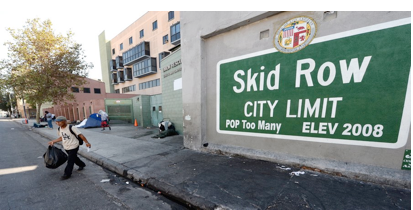CommentsGUEST COMMENTARY--The criminal justice system, burdened with being the de facto forum for dealing with the mentally ill population in Los Angeles County, has now becoming the forum of last resort to deal with the homeless population of which the mentally ill are a subset.
For three decades the Central City East Association (CCEA) has been warning that drugs, criminality, and mental health issues would converge at the epicenter of homelessness on skid row. Add into the mix Prop. 47, which in essence decriminalized theft and drug offenses, and a series of court rulings which have allowed the homeless to take over public streets and sidewalks, and you have an ungovernable mess. Yet homeless advocates and the attorneys they employ call it a civil right to live in squalor, and judges render decisions from their sterile courtrooms that play out far differently on the streets. Perhaps it would be considered untoward of us to suggest that the City sponsor a new homeless encampment on the sidewalks of 312 North Spring Street Los Angeles, the location of the Federal courthouse.
The street population is at nearly 2,000 in skid row alone. Businesses that remain do so despite the public safety and public health threat, wanting to stay in an area that is centrally located and to provide much-needed industrial jobs. However, an increasing wave of crime makes victims of area workers, residents and the homeless themselves. The violent nature of these crimes is escalating.
CCEA has released a powerful 5-minute video that allows the voices of the law enforcement, residents, and business community speak for themselves. "Emergency" is an intense tour of the daily gauntlet that is Skid Row
It contains disturbing images of inhumane conditions on public sidewalks with vivid descriptions of Skid Row as told by the people who live and work there. We urge everyone to watch the moving video and listen to the police officers who work on Skid Row. The question that is posed is one the leadership of Los Angeles City and Los Angeles County need to answer - how long will this nightmare be tolerated?
It is well-documented that support for the mentally ill in our society has declined over the years and that a significant number of the homeless living on our streets are mentally ill. When they cause a disturbance in the community, the police are the first to be called. If and when an arrest is made, it then is deposited in the laps of Deputy District Attorneys and Deputy City Attorneys to decide if charges will be filed - with the low expectation that any misdemeanor charge will result in a meaningful sentence.
Despite law enforcement's extensive training and new resources, the problems of homelessness and mental illness are vast. Last year, Los Angeles County District Attorney Jackie Lacey presented a comprehensive plan to the Board of Supervisors that recommends enhanced treatment and services to safely divert mentally ill offenders from the county jail. In Los Angeles, the Sheriff's Department and the LAPD are constantly collaborating with the various public and private sector organizations to better address the behavior of mentally ill individuals. However, at the end of the day, it is the community of Los Angeles that must demand of our elected leaders at both the state and local level a comprehensive plan to combat the true roots of homelessness.
As Oliver Wendell Holmes famously stated, "The right to swing my fist ends where the other man's nose begins." In the skid row area of Los Angeles, the homeless population is now not just swinging, but connecting, into the body of the law abiding residents who wish to walk the sidewalks or work in downtown Los Angeles.
(Michele Hanisee is President of the Association of Los Angeles Deputy District Attorneys. The Association of Deputy District Attorneys (ADDA) is the collective bargaining agent and represents nearly 1,000 Deputy District Attorneys who work for the County of Los Angeles. Views expressed by Ms. Hanisee are her own and the association’s.)
-cw
Sidebar
Our mission is to promote and facilitate civic engagement and neighborhood empowerment, and to hold area government and its politicians accountable.

 CityWatch Los Angeles
Politics. Perspective. Participation.
CityWatch Los Angeles
Politics. Perspective. Participation.
23
Tue, Dec















